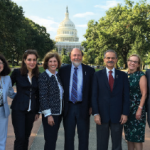
Building a team is more than just X’s and O’s; it’s about communicating trust and building confidence in your players.
Image Credit: Oez/shutterstock.com
We’re in this together for rheumatology and our patients. Those who know me appreciate my devotion to Duke Basketball and my pride in their recent NCAA championship. Coach K (Krzyzewski), a firmly established leader in the world of college basketball, makes the analogy that a basketball team is like five fingers on a hand, and when they function as a well-oiled team, they act as a fist. A group of talented individuals does not necessarily translate into a successful team. And it’s not all about X’s and O’s; it’s about communicating trust and building confidence in your players. All fingers are pointing in the same direction.
Over the years, I have seen how team defines the way we conduct advocacy activities in the American College of Rheumatology (ACR). I wish to share some of my observations and the ways we can combine our efforts to create victories on the advocacy field for our patients, practices and rheumatology.
Some Victories, & Some Big Moments Ahead
Over the past several years, the ACR has collectively ramped up its efforts in advocacy. I’m proud to say that this year has been marked by considerable progress under the leadership of Dr. Will Harvey and the other members of Government Affairs Committee, and with the combined advocacy efforts of many ACR members. We worked collaboratively with other professional groups to finally defeat the SGR by passing repeal legislation. We also worked together to delay the launch of ICD-10 until this October and played a leading role in the introduction of an ICD-10 safe harbor implementation period. CMS recently announced that claims will not be rejected during the next year because of selecting the wrong ICD‑10 subcode, a small victory for doctors.
We helped introduce federal legislation that combats high patient cost-sharing, enlisting an array of cosponsors on both sides of the aisle. We’ve engaged insurance companies that create barriers for our patients who must take costly biologic medicines to control their disease. We aided efforts to repeal the sequester cuts, especially to Part B drug payments.
In addition, we advanced legislation to reduce Meaningful Use reporting and administrative burdens for rheumatologists and other providers; CMS agreed to enact those provisions administratively.
Importantly, we have continued to aggressively support increased NIH funding for research.
Implementation of MACRA is a sea change for academic & hospital-based practices, & it has the potential to be an existential threat to many in private practice.
But we also face many threats across rheumatology and, in particular, the many new administrative burdens facing rheumatologists—especially solo practitioners and those working in small groups. Insurance companies are merging into powerful behemoths and building more and more roadblocks to timely and effective therapy by enacting burdensome preauthorization requirements, forcing patients to follow a stepwise treatment approach and implementing other tactics to save them money.

